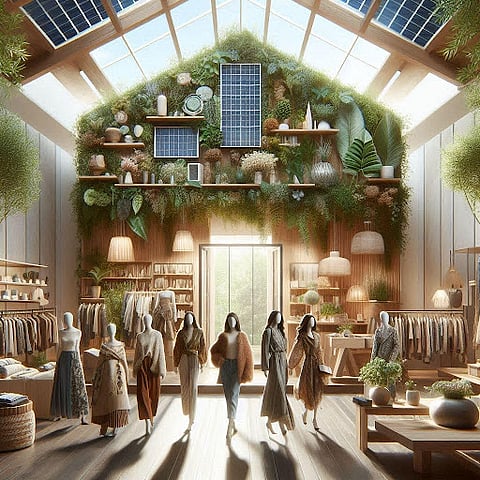How Upscale Lifestyles Embrace Sustainability in Fashion
Sustainability in fashion isn't just a trend. It’s becoming a necessity, especially among upscale brands and their clients. Wealthy consumers demand eco-friendly practices now more than ever. They want luxury that doesn’t cost the earth.
Think about custom designs. You can reduce waste while looking fabulous at the same time. This article explores how luxurious lifestyles align with sustainability efforts in fashion today.
Join me to uncover innovative strategies that keep style chic and green!
Innovative Textile Choices: The Shift Toward Sustainability
The narrative of fashion is being rewritten through eco-conscious textiles. Elite designers are leaning more toward materials like organic cotton, Tencel, and recycled polyester that epitomize environmental stewardship. These fabrics stand out for championing green practices while offering the plushness coveted by upscale consumers.
Picture the advancements in material production methods. Utilizing plant-based dyes slashes chemical runoff, boosting both sustainability and visual appeal. Forward-thinking brands also dabble in biodegradable options to ensure a more natural decomposition process.
Sustainability has become a catalyst for manufacturers to overhaul their methodologies comprehensively. Premiere fashion creators now forge alliances with textile providers who share a commitment to ethical standards. This pivot is crucial not only to satisfy consumer preferences but also to craft a future where opulence effortlessly coexists with ecological responsibility.
Custom Design as a Waste Reduction Strategy
Custom design approaches are pivotal in achieving waste reduction within the luxury fashion sector. Many brands now leverage techniques like made-to-order and bespoke designs to minimize excess inventory. Each piece becomes unique, catering specifically to customer preferences.
Embroidery adds an exquisite touch while allowing for greater resource efficiency. Instead of mass-producing garments, designers create custom items that incorporate intricate embroidery directly into the production process.
Printful exemplifies this trend by offering on-demand services that empower creators to personalize designs without contributing to landfill waste. This approach not only enhances brand value but also resonates with eco-conscious consumers seeking both style and sustainability in their wardrobes.
Consumer Behavior: Shifting Mindsets Toward Sustainability
Shifts in consumer behavior are reshaping the landscape of sustainable fashion. More affluent buyers prioritize eco-friendly choices and demand transparency from brands. Key factors influencing this shift include:
Consciousness: The spread of environmental awareness is propelled by the engines of social media and dedicated advocacy efforts.
Integrity: Shoppers are on the hunt for brands with a sincere dedication to sustainable practices, sidestepping those that simply ride the eco-trend wave.
Discernment: A growing number of consumers now favor a minimalist approach, opting for fewer items marked by high quality rather than a closet full of fast fashion, with an emphasis on durability and expert craftsmanship.
As buyer acumen sharpens, there's an expectation pressing upon luxury brands to genuinely embed sustainability into their DNA. This shift in consumer attitude is sending waves across the industry, stoking innovation and raising ethical standards at every link in the supply chain.
Collaborations That Drive Change in the Fashion Industry
The fashion industry witnesses a surge of impactful collaborations aimed at fostering sustainable fashion. Luxury brands are increasingly aligning with environmental organizations and innovative designers to create collections that balance elegance with eco-responsibility.
Imagine a renowned fashion house partnering with artisans who specialize in recycled materials. This collaboration not only brings fresh perspectives but also highlights the potential of waste reduction through creativity.
Industry leaders recognize these alliances as essential for progress, using their platforms to promote sustainable practices widely. By joining forces, brands can amplify their message and influence consumers while contributing to an industry-wide shift toward sustainability that feels both necessary and attainable.
How Brands Implement Eco-Friendly Practices
Luxury fashion brands are making significant strides in adopting eco-friendly practices behind the scenes, contributing to a more sustainable fashion industry. They implement various strategies that redefine traditional manufacturing methods.
Sourcing sustainably stands out as a key focus. Many brands choose organic or recycled materials from verified suppliers, reducing their environmental footprint.
Energy-efficient production processes are another priority. Organizations are channeling funds into tech advancements that slash energy use and pivot operations toward renewable energy sources.
Strategic waste management approaches are curbing surplus through robust recycling programs and transforming excess textiles into fresh creations. These all-encompassing endeavors showcase the potential for luxury brands to conduct business with consideration, laying down a marker for the broader industry to emulate.
A New Era of Luxury: Redefining Success with Sustainability
The luxury fashion realm is moving into an epoch where green practices coexist with grace. By integrating sustainable methodologies, brands do not just captivate the conscious shopper; they also sculpt a new definition of success.
This pivot fuels creativity, ignites transformation across the sector, and positions luxury fashion as a force for good in shaping our planet's destiny - all without compromising on everlasting elegance.
Inspired by what you read?
Get more stories like this—plus exclusive guides and resident recommendations—delivered to your inbox. Subscribe to our exclusive newsletter
Resident may include affiliate links or sponsored content in our features. These partnerships support our publication and allow us to continue sharing stories and recommendations with our readers.

